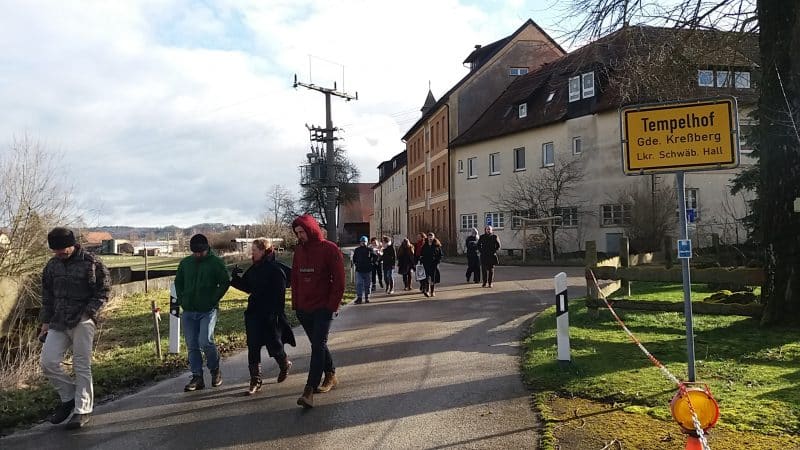
Participants in the Ecovillage Transition in Action project recently gathered in Schloss Tempelhof community in Germany to continue to develop a methodology for upscaling ecovillage solutions. Funded by ERASMUS+, the project looks at solutions and best practices applied in ecovillages and their cousin community-led initiatives to address complex social problems.
The meeting brought together representatives from ECOLISE, along with the University of St. Andrews, Global Ecovillage Network, GEN Germany and Kilden Økosamfunn. Their starting point is that sustainable community practices hold answers to many complex questions in current society where change is not easy.
The project aims specifically to create and test models of upscaling ecovillage solutions in order to help collaboration with municipalities and regional governments in finding adequate responses to climate challenges. The model will relate global strategies, reflected in the Sustainable Development Goals, to local solutions, interpreted through Dimensions of Sustainability.
ECOLISE Council member, ecovillager and author, Nara Petrovic from Slovenia, who attended the meeting reports:
“Global civilisation is based on direct human interaction being replaced by individual material aggregation and digital technology. The countryside is increasingly dominated by highly technological farming practices, with huge machines cultivating monocultural fields. Such a deeply fragmented society fosters narrow specialisation and nuclear family careerism. People are estranged from nature, culture and community.
For decades, ecovillages have been places of resistance against such a trend, preserving the highly heterogeneous identity of their communities with all the strands tightly interwoven, forming a strong social fabric. Eco-communities collaborate with their eco-systems, closely connecting people with the environment.
In practice, this manifests as community members growing food together, eating together, having fun together, deciding together, working together, learning together, taking risks together… One way of defining an ecovillage is as an open, compact unit of heterogeneous elements tightly linked in all directions, while modern cities have become rigid aggregates of repetitive, monogamous elements spreading everywhere on the planet, strengthening the corporate and weakening human connections.
In the wake of the climate crisis, the global approach to solutions remains urban and technological, and therefore limited to the dominant paradigm that caused the problem. Ecovillages offer a different approach, rural and organic; rural in the sense of human-scale integration of people with their living environment and organic in the sense of going along with, instead of against, nature.
The ecovillage perspective isn’t the only one, of course, in exposing fallacies of current society. Ecovillagers stand beside many others, inviting institutions and corporations to acknowledge and support the bottom-up, community-led approach to the climate crisis. The time when such approaches could be brushed off the table as too alternative, radical or marginal is over. Today, ecovillage approaches are backed up by sound scientific evidence, so it’s no wonder they’re penetrating the mainstream so fast. The reason is simple: If we don’t navigate through the transition wisely, the crisis will hit us the hard way.
It’s time for ecovillage social innovation to be translated to municipal and regional contexts, increasing the cohesion and resilience of local communities. The meeting in Schloss Tempelhof has shown that the Ecovillage Transition in Action project can play a visible role in strengthening the community-led response to the climate emergency.”
Date and Duration: February 2020, 3 days
Type of Event: Training for Erasmus+ Strategic Partnership
Language: English
Place: Schloss Tempelhof, Germany
